President Barack Obama's support comes from youth, women; former Massachusetts Gov. Mitt Romney is backed by men & older voters.
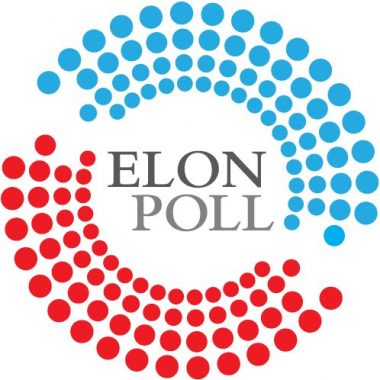
*****
North Carolina voters are split in their support of President Barack Obama and former Massachusetts Gov. Mitt Romney as the 2012 race for the White House enters its final days, according to the latest Elon University Poll.
With just over a week until Election Day, Republican challenger Romney and Democratic incumbent Obama both claim 45 percent of the vote in the Tar Heel State; about 5 percent of voters remain undecided, and within that group, leanings are evenly divided. Two percent said “neither.”
Findings indicate a tightening of the race in North Carolina since late August when the Elon University Poll found Romney with a lead of 4 percentage points.
The most recent live-caller telephone poll of 1,238 likely voters was conducted Oct. 21-26, 2012, and has a margin of error of 2.79 percentage points. Both landlines and cell phones were included in the sample.
Of those polled, more respondents said Obama was better able to handle national security, health care, foreign relations and immigration, and more voters said Obama has a clearer plan to address the country’s problems, is honest and trustworthy, and shares their values more closely.
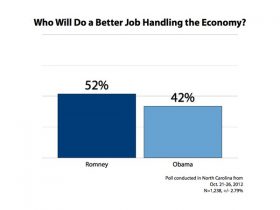
Romney outperformed Obama in the area of the economy. More than half of respondents – 52 percent – said the Republican would do a better job of handling the economy, compared to 42 percent for the sitting Democrat.
Obama is also polling much stronger among those who have voted early. The Elon Poll found the president leading Romney by a margin of 55-37. Among those who have not already voted, the challenger holds an advantage over Obama (48-43 percent).
The race is a statistical tie despite more than half of likely voters (52 percent) saying they believe the country is on the wrong track as opposed to the 43 percent of respondents saying it’s headed in the right direction.
However, there is also growing optimism about the economy, with 49 percent of likely voters believing it will get better in the next year and another 29 percent saying it will stay about the same. Just 8 percent believe it will get worse.
“The economy is the most prominent issue of the election and is an important reason why Mitt Romney is in a tight race with the incumbent president,” said Kenneth Fernandez, director of the Elon University Poll. “But respondents also seem to have a growing optimism about the economy. More people believe the economy will improve over the next year, and those optimists are more likely to vote for Barack Obama.”
AGE & INCOME
Younger voters in North Carolina favor Obama, while older voters show more support for Romney.
18-30: 56 percent Obama / 30 percent Romney
31-40: 50 percent Obama / 42 percent Romney
41-50: 51 percent Romney / 39 percent Obama
51-65: 53 percent Romney / 40 percent Obama
65+: 51 percent Romney / 43 percent Obama
Annual income is another clear divider of support between the two candidates. The lower the income, the more likely the respondent was to support Obama; higher income earners showed much stronger support for Romney.
Less than $25,000: 60 percent Obama / 30 percent Romney
$25,000-$50,000: 51 percent Obama / 41 percent Romney
$50,000-$75,000: 48 percent Romney / 47 percent Obama
$75,000+: 55 percent Romney / 38 percent Obama
RACE & GENDER
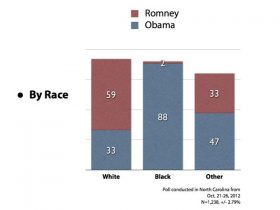
Levels of support for both candidates are characterized by the race of North Carolina likely voters as well.
White voters: 59 percent Romney / 33 percent Obama
Black voters: 88 percent Obama / 2 percent Romney
Other: 47 percent Obama / 33 percent Romney
“The findings here suggest that if African Americans and young voters turn out as they did in 2008 this will be a very close election. From August to October we found levels of excitement for both groups increasing,” Fernandez said. “Survey results and official statistics suggest that black turnout is on pace to match 2008 numbers. The youth vote is harder to predict and their excitement about the election still lags behind most other groups.”
More than half of all male likely voters support Romney over Obama (51-39 percent), and women support Obama over Romney (51-40 percent).
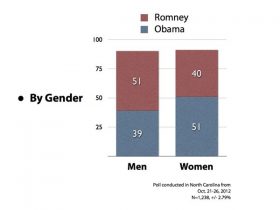
“Although there doesn’t seem to be a gender gap in voter enthusiasm or turnout, the gender gap in support for the two major party candidates is as large as ever, with men and women almost perfectly mirroring each other,” Fernandez said.
Among all subgroups of women, only those who are married are more likely to vote for Romney. Single, divorced and widowed women all show more support for Obama.
ON THE ISSUES
North Carolina likely voters cited Obama as best able to handle many different issues – most pronounced were foreign relations and health care – with the exception of the economy, which Romney was seen as better able to address.
The candidate best able to handle each issue:
Economy: Romney (52 percent) versus Obama (42 percent)
Relations with Other Countries: Obama (52 percent) versus Romney (42 percent)
Health Care: Obama (50 percent) versus Romney (43 percent)
Immigration: Obama (47 percent) versus Romney (45 percent)
National Security: Obama (47 percent) versus Romney (46 percent)
CANDIDATE CHARACTERISTICS
Obama narrowly edged out Romney among North Carolina likely voters when asked which candidate best shares their values and which candidate has the clearer path for addressing the nation’s problems.
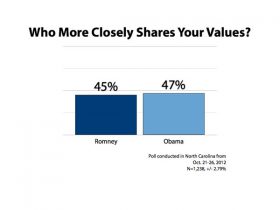
Which candidate shares your values more closely?
Obama: 47 percent
Romney: 45 percent
Which candidate is more honest and trustworthy?
Obama: 46 percent
Romney: 38 percent
Which candidate has the clearer plan for addressing the country’s problems?
Obama: 45 percent
Romney: 41 percent
Which candidate would be more likely to raise taxes on the middle class?
Romney: 49 percent
Obama: 37 percent
THE RACE to be NORTH CAROLINA’S NEXT GOVERNOR
In the North Carolina gubernatorial race, Republican Pat McCrory, the former mayor of Charlotte, is supported by 52 percent of likely voters. Democratic Lt. Gov. Walter Dalton is supported by 38 percent of voters. Eight percent said they “don’t know” who they plan to support.


